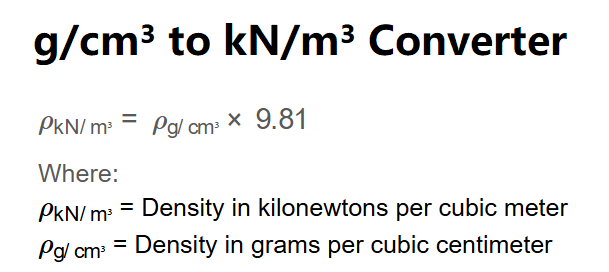 Home
Home
 Back
Back

g/cm³ to kN/m³ conversion is a unit transformation for density, converting grams per cubic centimeter (g/cm³) to kilonewtons per cubic meter (kN/m³). This conversion accounts for both mass density and the force due to gravity, as kN/m³ represents the weight density (force per unit volume) rather than just mass density. The conversion factor is based on \(1 \, \text{g/cm³} = 1000 \, \text{kg/m³}\), and with gravitational acceleration (\(g \approx 9.81 \, \text{m/s}^2\)), \(1 \, \text{kg/m³} = 9.81 \, \text{N/m³}\), and \(1 \, \text{kN/m³} = 1000 \, \text{N/m³}\), resulting in \(1 \, \text{g/cm³} = 9.81 \, \text{kN/m³}\). This is useful in civil engineering and geotechnical applications.
For example, a density of 1 g/cm³ converts to 9.81 kN/m³.
Conversion Formula: The density in kN/m³ is calculated as:
\(\rho_{\text{kN/m³}} = \rho_{\text{g/cm³}} \times 9.81\)
Where:
Example Calculation: For a density of 2.5 g/cm³:
Use the form above to input the density in g/cm³, and the calculator will convert it to kN/m³.
The calculator converts between the following density units:
Other common conversions include:
Some standard densities include:
Use this calculator to convert these values or your own measurements.
How do you convert g/cm³ to kN/m³?
To convert g/cm³ to kN/m³:
What is the density of water in kN/m³ if it is 1 g/cm³?
The density is \(1 \times 9.81 = 9.81 \, \text{kN/m³}\).